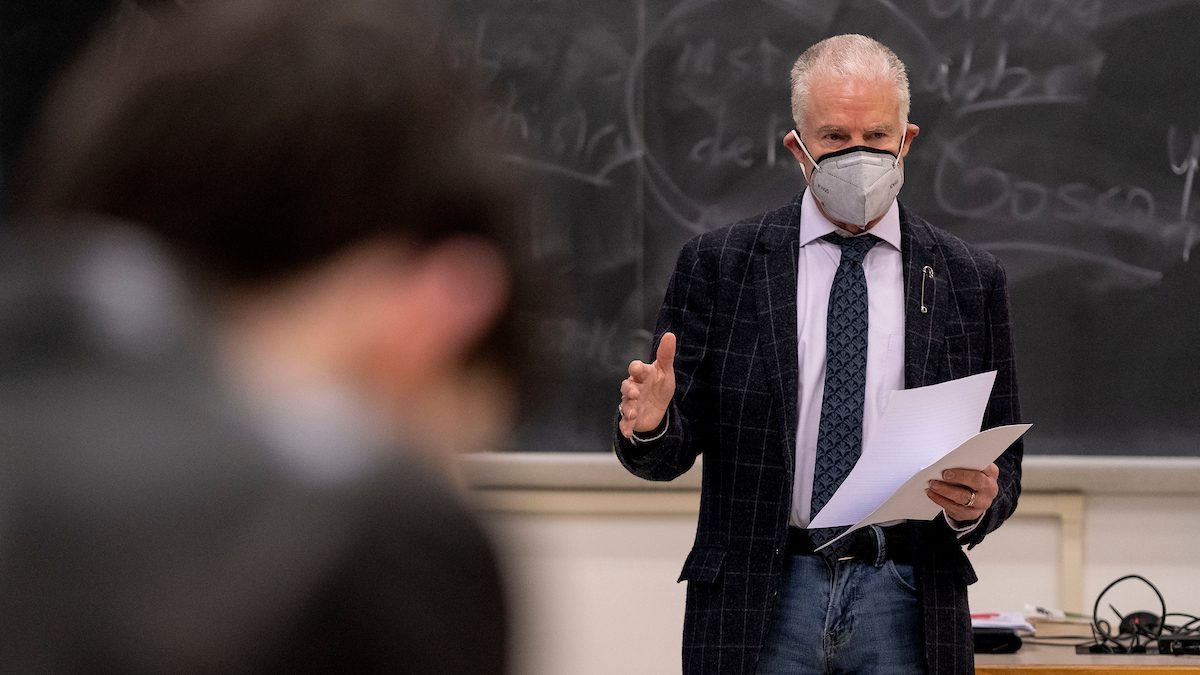Jim Lampley trades sports desk for classroom
As a network sportscaster, he covered 14 Olympics. Now he teaches students the history of broadcast storytelling and how technology shaped it.

Jim Lampley could have become a professor of the practice the easy way. After all, with his decades of experience in sports broadcasting, just sharing stories from his Emmy-winning career would have been educational, not to mention entertaining, for communication students at Carolina.
But Lampley didn’t only want to regale students about his interviews with boxing greats, his globe-trotting years with ABC’s Wide World of Sports or his record-setting Olympics coverage. “I wanted to create a class that has enough merit as a college course that it could remain in the catalog long after I’m gone,” Lampley said.
The result is COMM 490, Evolution of Storytelling in American Electronic News Media, which Lampley has taught for three semesters, all during the pandemic. The course examines how technological progress, politics and other factors have changed the way news stories are told. He begins with the groundbreaking radio journalism of Edward R. Murrow and continues through the present day. A recent class dealt with news streaming.
“Originally, news was about what you need to know. But more and more, it has become what you want to know,” Lampley told his class. “Streaming the news to paid subscribers is about getting an audience to pay for something they want to hear.”
He points out that his professional experience illustrates how technology shapes storytelling, from the breakthrough that launched his career to the miracle of videotape that captured his best sports memory.
Bright future
Lampley got his start because of advances in technology developed during the coverage of the Munich Olympics in 1972. Using wireless technology, ABC planned to broadcast live sideline interviews during its college football game coverage for the first time.
To publicize the new coverage, they launched a national talent search to find “the face and voice of a college student,” an undergraduate with no previous experience that they could turn into a star. In 1974, Lampley was a graduate student in radio, television and motion pictures (a precursor to the communication department) with lots of broadcasting experience. He ran the sports desk for WUNC-TV and hosted and reported on UNC pre-game and post-game shows for WCHL radio.
Otherwise he fit the bill — preppy looks, encyclopedic sports knowledge and adept on-air personality — so RTVMP professor Wesley Wallace urged him to try out. Wallace suspected that the closer the live broadcasts got, the more the network would value a veteran over a novice. And he was right. Lampley got the gig.
But knowing the slim odds of making it as a star announcer, Lampley also asked ABC to hold a program planning position for him so that he could pursue the executive side of the business. At the end of the season, he was devastated to learn that the programming job had been given to someone else. The network had bigger plans for him; they just hadn’t told him yet.
“Did you really believe that after flying first class from college town to college town, interviewing the leading lights of college football and having people shout your name from the stands that you were going to go into a cubicle for $1,500 a month, shuffling papers?” his mentor at ABC, Chuck Howard, asked him.
Instead, Howard assigned Lampley to host Wide World of Sports events starting in February and planned to send him to Innsbruck, Austria, for coverage of the next Winter Olympics in 1976. So began what Lampley calls his 47-year adventure in broadcasting,
Miraculous memories
That adventure included stints with ABC Sports, ABC News, CBS Sports, CBS News, NBC Sports and Turner Network Sports. For 31 years at HBO, he was host of boxing and Wimbledon tennis and senior reporter for “Real Sports with Bryant Gumbel,” for which he won three Emmys.
Lampley is perhaps best known for his decades-spanning Olympics coverage, his last assignment being the 2008 Summer Games in Beijing, home to the current Winter Games. Lampley’s 14 Olympics television assignments, most of them as a studio host, are the largest number for any American broadcaster.
In picking a favorite Olympics memory, Lampley recalled the Miracle on Ice, when the U.S. hockey team upset the heavily favored Soviet Union in the medal round of the 1980 Lake Placid Winter Games. Sports Illustrated later named it the top sports moment of the 20th century.
Sportscaster Al Michaels called the game, famously asking as the final seconds ticked off, “Do you believe in miracles?” But Lampley was there, sent by ABC Sports Director Roone Arledge mid-game to secure an interview for what would be the only live part of the presentation. (The game was played at 5 p.m. and tape-delayed for prime-time broadcast at 8:30 p.m.) Lampley still gets choked up remembering the “most famous goal in hockey” by American team captain Mike Eruzione, the man he interviewed live.
Whenever he sees Eruzione, he teases him that he must be the leading goal maker in hockey history, based on how many times the clip of his winning shot has been played on the air.
“And he always says, ‘Lamps, it keeps going in, doesn’t it?’”




